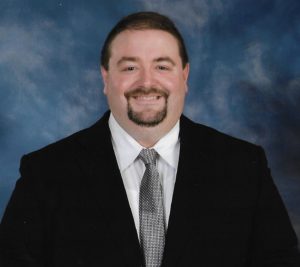By: Brian Chilton | January 3, 2018

2017 was a challenging year in many respects for American Christians. But, what are the most pressing issues that Christians will encounter in 2018? Here is my top-ten list that will discuss that very issue. In contrast to previous lists that I have presented, this list will only focus on American Christianity, particularly the theological issues that apologists and pastors will face in the year ahead. This comes from my observations from various social media discussion groups on Facebook, Twitter, and from various magazines, books, and television.
10. Relaxed Morality. I have noticed that many Christians have relaxed their views on such issues as abortion and marriage. Perhaps this is due in part to the pressures placed upon them from society at large. Shockingly, a growing number of Christians are accepting polygamous, polyamorous, and open relationships. The apologist and pastor will need to maintain their commitment to biblical ethics in these areas. They should expect a mounting resistance to ethical teachings, especially on the more hot-button issues.
9. Racial Reconciliation. 2017 saw a lot of tension in racial matters, especially with the division over Confederate monuments. Pastors and apologists alike will need to emphasize the global and multi-ethnic nature of the gospel message.
8. Decline in Attendance. Many churches will face tough decisions in the year ahead. I read somewhere where around 4,000 churches close each year (Lifeway Bookstore president Thom Rainer has suggested that the number may be as high as 10,000) where only 1,000 are starting up. Denominations will need to push to create more church plants. Struggling churches will need to make efforts to change their strategy or face the very real possibility of closing their doors.
7. Relative Truth Claims. For those who have followed my blog, you know I have mentioned this multiple times. Yet, it bears repeating that many Americans have bought into the ideology that truth is relative. It’s the ‘ol “What’s true for you may not be true for me” routine. But, is that true for everyone? This only shows the growing need for more trained apologists and more apologetic pastors.
6. Apathy. A growing number of American Christians are becoming apathetic in their viewpoint of evangelism, discipleship, biblical doctrine, and spiritual disciplines. If American Christians are going to reach their communities, they are going to need to take these issues seriously. Thom Rainer recently said that the modern pastor needs to be a continuous learner if he is going to be effective. I concur.
5. Political Demagoguery. Political disunity has wreaked havoc on America. The 2016 Presidential Election was one of the most divisive elections in American history. The pastor and apologist need to make an effort to speak less about their political affiliations and more about the salvific work of Christ. You aren’t going to change a lost person’s ethics until you change their doctrine. You won’t change their doctrine until the Lord changes their hearts. Our national problem is a sin problem. Period.
4. Growing Importance of Apologetic Evangelism/Reaching the “Nones.” Few American Christians share the gospel. For those who have become the “nones” (those who have no religious affiliation), it will take a Holy Spirit-driven apologist to discover why that person left the faith. American Christianity must place a higher value on evangelism and home missions in 2018.
3. Biblical Illiteracy/Anti-intellectualism. Fewer American Christians are placing an emphasis on learning what the Bible says. In many circles, a person’s opinions are given higher value than biblical doctrine. Some say that learning the Bible is useless. American Christians will need to have their appetites for Scripture whetted. The only way to change the mounting American biblical illiteracy is to train not just pastors and church leaders, but to train all Christians the fundamentals of Scripture. That is exactly what we set out to do here at Bellator Christi.com.
2. Need for Another Spiritual Awakening. This point nearly made the number one challenge. In fact, I’m still not so sure that it shouldn’t be ranked number one. America is in dire need of another Great Awakening as was found in the days of John Wesley and George Whitefield. Christians need to pray that the Spirit would take hold and awaken America to the importance of Christ and of his word.
1. Decline of Biblical Authority. Jason Kline and I have had some deep discussions about this issue. I have also spoken with Phil Fernandes about this issue on The Bellator Christi Podcast. A growing number of Christians are placing a low value on biblical authority. By biblical authority, I am especially noting the importance of accepting all of Scripture as true. Some have claimed that the teachings of Jesus in John’s Gospel are not really Jesus’s own words, but rather John’s invention. Others have claimed that certain narratives are untrue and are merely allegorical. At Nabeel Qureshi’s funeral, Dr. Jim Tour, a mentor to Nabeel, told the story about when he shared with Nabeel the importance of accepting all of the Bible as true. Dr. Tour’s advice applies to us, as well. We are not going to be taken seriously if we are not taking the Bible seriously. As Frank Turek has said, “If Genesis 1:1 is true, then every other part of the Bible could be true.” If God can create everything out of nothing, then it is no problem for him to resurrect Jesus on the third day, or as many accompanying Jesus’s resurrection as he desires.
Do you agree with this list? Are there other challenges you would add? If so, leave a comment below. Let us all pray that God would move in the American church in 2018.
About the Host
 Brian Chilton is the founder of BellatorChristi.com and is the host of The Bellator Christi Podcast. He received his Master of Divinity in Theology from Liberty University (with high distinction); his Bachelor of Science in Religious Studies and Philosophy from Gardner-Webb University (with honors); and received certification in Christian Apologetics from Biola University. Brian is currently a student of the Ph.D. program in Theology and Apologetics at Liberty University. Brian is full member of the International Society of Christian Apologetics and the Christian Apologetics Alliance. Brian has been in the ministry for over 14 years and serves as the pastor of Huntsville Baptist Church in Yadkinville, North Carolina.
Brian Chilton is the founder of BellatorChristi.com and is the host of The Bellator Christi Podcast. He received his Master of Divinity in Theology from Liberty University (with high distinction); his Bachelor of Science in Religious Studies and Philosophy from Gardner-Webb University (with honors); and received certification in Christian Apologetics from Biola University. Brian is currently a student of the Ph.D. program in Theology and Apologetics at Liberty University. Brian is full member of the International Society of Christian Apologetics and the Christian Apologetics Alliance. Brian has been in the ministry for over 14 years and serves as the pastor of Huntsville Baptist Church in Yadkinville, North Carolina.
© 2018. BellatorChristi.com.






Hi, Audrey. Thank you for you question. While I agree with you that believers should concern themselves with political issues, especially when those issues are impacting a person’s rights, I do not always think that church is the place to address these issues unless the issues intersect with clear exegetical areas of Scripture. I hold to a biblical eschatology that lays claim that all nations will eventually succumb to the power of God’s kingdom. This is something comparable to what Jesus teaches in speaking of an “already-not-yet kingdom.” Yes, it is true that politics is important. It is also true that believers should stand upon biblical and ethical principles. But the ultimate authority is not found in a nation’s Constitution, but rather in the truths found in God’s revelation. Unfortunately, far too many people have forgotten the greatest message (the Sermon on the Mount) while resting upon the messages of modern-day politicians. I will conclude with advice given to me by my grandparents when I started in the ministry. They said, “As long as you keep your messages between the covers of Scripture, you are standing on solid ground. But if you leave the confines of the Bible, you are on your own.” Just an opinion from a fellow believer in Christ.
Blessings,
BC
Can I please get more clarification on point 5. I understand that politics should not take the place of scripture, but if actions are being pushed that affect our rights as Christians shouldn’t that be addressed in the church?
Hello Brian,
The ones you have written are certainly applicable. But the science oriented public hears the loudest noise from Christianity with anti-science rhetoric of young-earth creationism and flood geology. I heard it very clearly at the Grand Canyon in 2016 – Christianity is bloodied here at the Grand Canyon. This now affects almost 40% of the U.S. population, and divides the church. As R.C. Sproul said in a panel discussion, “A Church divided against itself cannot stand!”
Respectfully,
Ken Wolgemuth, Christian geologist
Ken,
I appreciate your insights. This is an area where I think we as a church need to exhibit grace. Unfortunately, I don’t always think this has been the case in the area of the age of the earth. I think that the believer has nothing to fear with science. All truth is God’s truth. The anti-science rhetoric could feasibly be included with anti-intellectualism. I like the Moravian quote that says, “In essentials, unity; in differences, liberty; but in all things, charity.” Continue your good work, my friend.
Blessings,
Brian
Items 9 and 10 are just signs of the times. 200 years ago, the fretting about relaxed morals might’ve been replaced with fretting about attacks on slavery.
7: If you’re claiming objective morality (moral truths that are valid and binding whether anyone believes them or not), I’d like to see evidence. I’ve seen none.
I think if a person reads the Bible responsibly, they will see that it does not support slavery. Now, some will counter claiming that the Bible advocates slavery in some portions. However, ancient slavery as discussed in biblical times was not the same as colonial slavery. It was a means by which a person could work oneself out of bankruptcy. Debts were forgiven at particular points of time. That said, the Judeo-Christian ethic supports the importance of each person.
Discussing the objectivity of truth, I was discussing the absolute nature of truth itself. Pertaining to objective morality, all societies share similar values when dealing with people of their own tribe and tongue. While there are certainly gray areas in some areas of ethics, by and large I think certain ethical behaviors are objective in nature.
Blessings,
Brian
Biblical slavery was pretty much identical to American slavery. The Bible talks about indentured servitude (limited bondage for people like us) and slavery for life (for people unlike us). See Lev. 25:44-46.
I’ve discussed this in detail, in response to a J. Warner Wallace article, here:
http://admin.patheos.com/blogs/crossexamined/2014/08/yes-biblical-slavery-was-the-same-as-american-slavery/
Apologists are quick to claim objective morality, but they never do the heavy lifting of actually defending it. If you’re saying that objective morality is moral truth that is valid and binding whether there’s anyone there to appreciate it or not, I’ve seen that argument made many times but never seen evidence for it.
Actually, Bob, J. Warner Wallace is right. Biblical slavery was known as indentured servitude. Most biblical scholars would agree. Colonial slavery did not allow an individual to be set free. In Hebraic versions, the person worked off a debt and was set free. Judaism celebrated the Year of Jubilees which occurred every fiftieth year (Leviticus 25:1-4, 8-10). In a sense, this gave individuals the ability to save face, rather than become completely destitute. In the Greco-Roman world, there were different versions of slavery. But, in the Hebraic version, the individual retained their rights.
Reading your article, there may be some similarities between indentured servitude of the Hebrew version and the indentured servitude Colonial version. However, there are vast degrees of differences as well. Colonial slaves were taken from one land to another without their consent. Colonial slaves were viewed as property, unlike the Hebraic version. The list could go on. I would defer you to Paul Copan’s book “Is God a Moral Monster” chapters 12-14. I would agree with Wallace in this regard. The only other option for individuals of ancient times who were financially bankrupt was for them and their families to starve to death. Considering the alternative, indentured servitude was morally acceptable.
In response to your second paragraph, I would say that your objection to slavery is an example of objective morality. You are offended by Colonial slavery. So am I. Why is this? Because we understand human beings to have value. That is an objective moral.
Blessings,
Brian
“Biblical slavery was known as indentured servitude.”
You seem to imagine it was just one thing. It wasn’t. Lev. 25:44-46 makes this clear.
“Colonial slavery did not allow an individual to be set free. In Hebraic versions, the person worked off a debt and was set free.”
You’re comparing two kinds of slavery. America and the Israelites had both kinds.
Here’s what God says: “Your male and female slaves are to come from the nations around you; from them you may buy slaves. You may also buy some of the temporary residents living among you and members of their clans born in your country, and they will become your property. You can bequeath them to your children as inherited property and can make them slaves for life.”
“I would say that your objection to slavery is an example of objective morality. You are offended by Colonial slavery. So am I. Why is this?”
Because we’re both the same species.
What we see in humans is shared or viscerally felt moral programming. This can look like it’s objective (that is, grounded outside us), but there’s no evidence of this external grounding. If we have a natural explanation, let’s go with that.
Okay, here is part of the problem. No matter the text, we cannot cherry-pick verses and take them out of context. We must interpret the text in relation to the greater text around it and according to greater message of the book and books of the Bible. Ancient Israelites employed indentured servitude as a means of protecting families from starvation. I think it is pretty clear, as Wallace and Copan argue. Going back to the text you reference, you are not interpreting the text in its greater context. Here again, I would defer you to Paul Copan’s work.
Your statement “Because we’re both the same species” identifies the very thing I am referencing. There is objective morality within the human species which illustrates the objectivity of morality itself. Morality especially holds ground once one identifies the special nature of human life. If there is no God, then nothing has any purpose. Since God does exist, humanity holds higher value which grounds the objective morality of which you accept. If it looks programmed, then maybe it is by God. How does nature answer anything if it stemmed from the same accident that caused our being in relation to morality? If you are saying that morality came by our society, then you have no ground to condemn slavery or dictators like Hitler. But, morality is based on an objective basis beyond the scope of humanity. Therefore, there is a right and wrong and then we do have a basis upon which we can claim something as good and evil.
“No matter the text, we cannot cherry-pick verses and take them out of context.”
1. I apparently have far higher standards for God’s word than you do. Seems to me that the omniscient creator of the universe could inspire a book that was unambiguous.
2. I’m cherry picking but not taking them out of context.
“Ancient Israelites employed indentured servitude as a means of protecting families from starvation.”
And indentured servitude in America helped millions start a new life here who couldn’t any other way.
“Going back to the text you reference, you are not interpreting the text in its greater context.”
Huh? Lev. 25:44-46 talks about slavery for life. What “greater context” will change this embarrassing fact? They had indentured servitude for fellow Israelites and slavery for life for other people.
“There is objective morality within the human species which illustrates the objectivity of morality itself.”
There is shared morality. I’ve seen no evidence of objective morality (defined by WLC as moral truth that is valid and binding whether there is anybody to appreciate it or not).
“If there is no God, then nothing has any purpose.”
You mean: nothing has any *absolute* purpose.
“morality is based on an objective basis beyond the scope of humanity.”
Demonstrate it. Take a contentious issue like abortion and show us the resolution of the problem that is (1) objectively true and that (2) humans can reliably access.
I again say that you are cherry-picking the verses. It is true that the ancient Hebrews had Gentile slaves. But it appears that this law is regulating an already existing practice. Jesus said concerning divorce that some things in the law were allowed but were not according to God’s will (Matt. 19:8). It is easy just to look at a text and think that it means a certain thing. However, further investigation allows for better insight as to the situations that existed in the time. Many scholars have noted that the ethical treatment of all human beings in the OT was head and shoulders higher than what one finds in the Code of Hammurabi. As I have already mentioned, I would defer you to the experts on this topic, Paul Copan being one of them.
Concerning objective morality, you have not answered my question. You bear the burden of proof. If morality is shared morality, then by what authority do you have to say that cultures that kill homosexuals are wrong when it is shared that they should be killed by the society? By what authority can you claim that it was wrong for Hitler to kill 11 million individuals, mostly Jews, when the Nazi government acted on a shared belief? We know that it is wrong because morality is objective. Otherwise, all you have are opinions. Any claim that demerits the objective nature of morality is self-defeating especially when such person issues a moral claim. Objective morality demands an objective lawgiver–i.e., God.
“I again say that you are cherry-picking the verses.”
And I agreed with you! What I said was that I wasn’t taking them out of context.
What does it say that the Bible is cherry-pickable? Let me answer that: it says that Christianity is a religion that can have 45,000 denominations because the Bible is malleable enough to support just about any claim you want.
“It is true that the ancient Hebrews had Gentile slaves.”
Then why didn’t we get past this earlier?
Note also that they were slaves for life.
“But it appears that this law is regulating an already existing practice.”
You know how God gave the 10 Commandments with lots of “thou shalt nots”? God has no problem prohibiting something. Don’t tell me that omnipotent God was constrained by a cultural custom.
“Many scholars have noted that the ethical treatment of all human beings in the OT was head and shoulders higher than what one finds in the Code of Hammurabi.”
Neither God nor Jesus prohibited slavery. What does that say to you?
“If morality is shared morality, then by what authority do you have to say that cultures that kill homosexuals are wrong when it is shared that they should be killed by the society?”
When I say that that’s wrong, the authority is *me*. It ain’t much, but it’s all I’ve got. What other authority can I use when it comes out of my mouth??
I can point to an ancient book to back me up (using the Bible is a problem because it can be cherry picked to say just about anything), but so what? To get to objective morality, you must actually defend the claim.
“We know that it is wrong because morality is objective. Otherwise, all you have are opinions.”
Yes, just opinions. I need an argument for objective morality. You can’t just assume it.
Okay, this will be the last post on the issue unless we are able to further the conversation. We are essentially spinning our wheels. There are many things that must be asked in relation to the slavery issue in Scripture: Was this standard practice? What would have occurred if the enslaved individuals would have been released into their society? (Would they have been able to survive on their own with no land, no livestock, and no means of supporting themselves?) How were such individuals treated? Was it commanded to treat them ethically? You have a very black and white view on this issue, failing to see the potential gray areas. Did God and Jesus desire that someone be enslaved? Of course not! Quite honestly, loving God and loving one’s fellow man is the whole and sum of the law. Why were these practices allowed? I really don’t know–which is why I deferred you to Copan and others more knowledgeable on the topic and ancient law practices. God desired to use Israel as a blessing to the nations. Could it have been that by allowing these individuals to be enslaved that they would have known God and be freed from their sins which otherwise would not have been available to them? Perhaps. This is where God’s middle knowledge comes into play. Nevertheless, if you take the overall progressive of God’s revelation, you will find that it is God’s will to redeem all people. Why did God just not do it? It would have impeded human freedom. But it is erroneous and quite anachronistic to claim that the Hebrew practice of slavery was the same as Colonial American slavery. It simply was not. Colonial American slavery consisted of going forth and purchasing slaves. The vast majority of slavery that consisted in ancient Israel was indentured servitude. Note that the passage centers upon such a practice and only adds a blurb pertaining to Gentile slavery. This is something I will research more moving forward.
Again, related to the issue of objective morality, you cannot just claim yourself to be an authority on morality if you do not have an objective standard. I think you do see the argument for objective morality, but do not want to accept it because of its implications. In fact, you are implicitly arguing for objective morality by the claims you have presented. You could put it something like this:
1. Objective morality must exist beyond the scope of individual opinion.
2. Some moral truths exist beyond the scope of individual opinion (e.g., it is always wrong to murder an innocent person).
3. Therefore, objective morality exists.
It is quite evident that this is the case and that objective morality exists. The moral argument is as follows:
Premise 1: If God does not exist, objective moral values and duties do not exist.
Premise 2: Objective moral values and duties do exist.
Conclusion: Therefore, God exists.